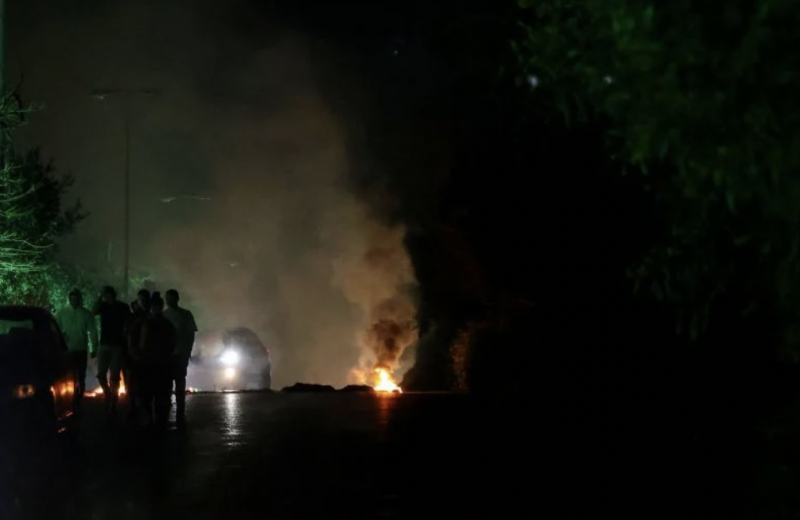
Lebanese Forces rioters block a road in Jbeil, Monday April 8, 2024. (Credit: Joseph Eid/AFP)
Syrian citizens in Achrafieh, Jdeideh and Sin al-Fil had till Saturday midnight to evacuate these Christian neighborhoods or they’d have to deal with the residents, messages that circulated on social networks said.
Obscure organizations issued these warnings and they were not to be taken seriously.
Nevertheless, these ultimatums reflect a general mood that has prevailed in the country since the murder of Lebanese Forces (LF) Jbeil official Pascal Sleiman.
While the official investigation — which is hardly convincing — pointed the finger at a gang of Syrians who were trying to steal the victim’s car, hatred is surging against this already marginalized community.
Since Monday, every evening in Lebanon has had an air of Kristallnacht about it. Helpless innocents were insulted, humiliated, beaten up and kidnapped simply because they were Syrian.
A Syrian food delivery boy was tied up, his hair and beard shaved, by a group of youths. The whole thing was filmed and posted on social media by our “national heroes.”
Many municipal councils have decided to impose curfews on Syrian nationals, even to close their stores. Why not enforce a yellow badge at this point?
This collective hysteria is taking place under the complicit eye of the government and political parties involved, quite happy to see Syrians be scapegoats for their sins again.
Fewer residency permits
Although Sleiman was kidnapped during the day and transported to Syria smoothly, caretaker Interior Minister Bassam Mawlawi did not deem it necessary to point to the public authorities’ failure.
Instead of acknowledging his responsibility and announcing the implementation of pressing reforms linked to the open border between the two countries, he once again made Syrians a proverbial punching bag.
At a press conference following the National Security Council’s meeting, Mawlawi elaborated that, following the murder of Sleiman, he decided to impose “further” restrictions on residency permits for Syrians.
This was an (inappropriate) solution that absolved the minister of any responsibility and “depoliticized the case,” much to the delight of Hezbollah whose satisfaction is needed for someone who wishes to access the Grand Serail.
Sleiman’s case came amid an acute divide over Hezbollah and its arsenal. As soon as the LF lost contact with its official, Hezbollah — whose opponents always seem to disappear — was singled out by an increasingly radicalized Christian public opinion.
But as the authorities and Hassan Nasrallah emphasized the nationality of the suspects arrested by the security forces, public anger was quickly redirected towards the Syrian refugees and migrants. The focus has now shifted away from the real issue: The state’s disintegration.
This works well for Hezbollah, which controls the dozens of illegal border crossings the kidnappers had to use to arrive in Syria, and occupies the area stretching from the border to Homs where the kidnappers hid. Hezbollah also takes advantage of the weakened authorities to reinforce its stature as a state within (and alternative to) the state.
Its major ally, the Syrian regime, waited four days to release a feeble statement by its embassy on the multiple attacks against its nationals. This regime has inflicted far worse on them in Syria. Otherwise, they wouldn’t be here.
‘Political crime until proven otherwise?’
But it’s not just Hezbollah that’s taking advantage of this situation, it’s also the LF. Officially, the party considers Sleiman’s murder a “political crime until proven otherwise.” However, the LF are keen to contain the boiling of their popular base, because it would be madness to risk a tough confrontation with the Iran-aligned militia.
Dragging a civilian out of a car with a Syrian license plate is, by comparison, a piece of cake. Maarab waited four days before issuing a brief statement condemning the violence. Most of the text said that refugees should return to Syria, and only briefly criticized these “acts of hatred.”
Similarly, Samir Geagea protected himself from any potential accusation of racism in his discourse at Sleiman’s funeral on Friday. He did not, however, call on his supporters to cease hostile acts against Syrians — nor did the Maronite patriarch.
This position is even more disappointing because the LF is one of the few parties that recognized that the refugees’ return is impossible as long as the Syrian regime’s bloody machine of war and repression is in place.
This is not to deny that the massive presence of Syrian refugees and migrants is a challenge for Lebanon. Nor is it to say that the LF should have chosen confrontation with Hezbollah. Finally, it’s not to assert that Hezbollah is behind the murder of the LF executive (even though, willingly or not, it facilitated the crime).
This is simply to say that only a strong state can do justice to Sleiman and ensure that he is the last to die in this way. It’s not by attacking innocent people, who are victims of the same executioner, that we’ll be able to build this strong state.
The kidnappers of Pascal Sleiman may be Syrian. But the gang responsible for hijacking our country is Lebanese.
This article was originally published in L'Orient-Le Jour. Translated by Joelle El Khoury.